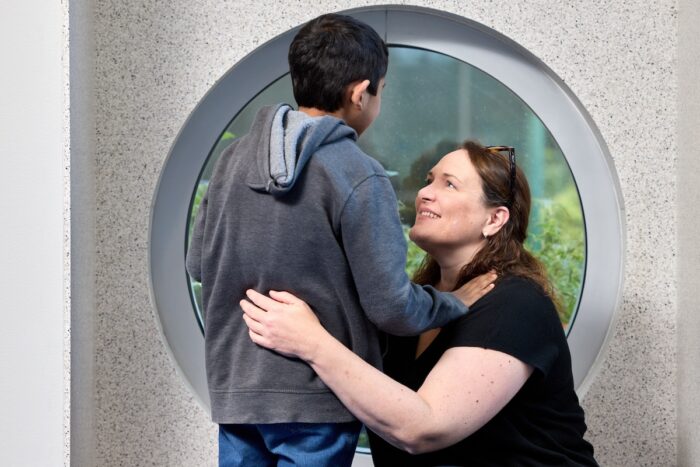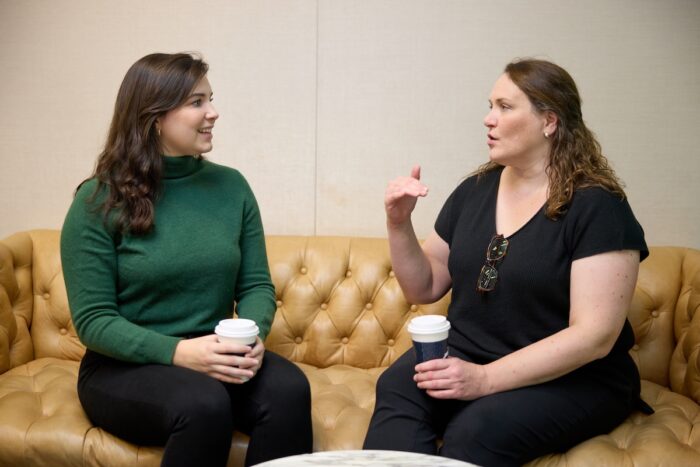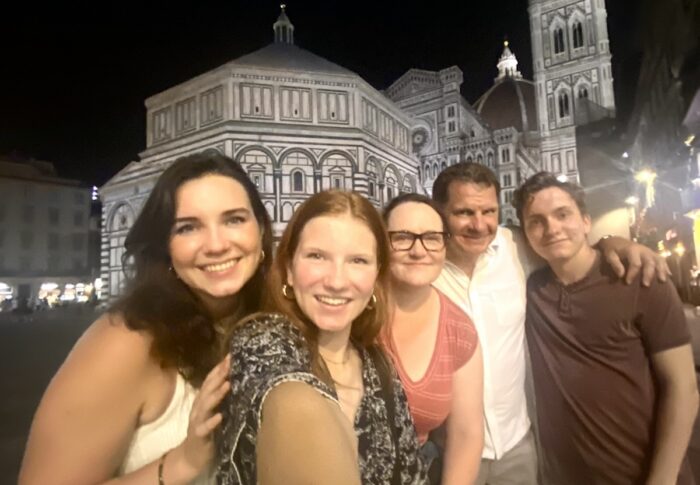Washington People: Juliane Bubeck Wardenburg
Physician-scientist brings empathy, compassion to families with children in critical care
 Matt Miller
Matt MillerJuliane Bubeck Wardenburg, MD, PhD, the Donald B Strominger Professor of Pediatrics at WashU Medicine, often visits her former patients when they return to St. Louis Children's Hospital. Bubeck Wardenburg treats patients in the PICU and conducts research that may help stop Staphylococcus aureus from making children sick.
At a dinner party three years ago, two families that were connected by an unimaginable situation cherished a joyful evening. Laughter, heartfelt conversation and the aroma of traditional Pakistani fare filled the room.
For the evening’s hosts, such happiness had been inconceivable months earlier, when their 10-year-old son and dinner guest Juliane Bubeck Wardenburg, MD, PhD, the Donald B Strominger Professor of Pediatrics at Washington University School of Medicine in St. Louis, first met. That day, Yahya Fahad was admitted to the pediatric intensive care unit (PICU) at St. Louis Children’s Hospital. He was in critical condition with swelling, low blood pressure and inadequate oxygen to supply his body’s needs.
“It was one of the hardest moments in our lives,” said Yahya’s mother, Maliha Fahad, who practiced medicine in her home country, Pakistan, before moving to the U.S. in 2020. “And then we met Dr. Bubeck Wardenburg, and experienced her kindness, empathy, patience and reassurance. Her compassion for our situation brought us comfort. Her support helped us feel confident. In that vulnerable moment, she embraced us in her care as she would her own family.”
Yahya’s illness played out unpredictably. He suffered from nephrotic syndrome, a kidney condition that causes the body to excrete too much protein in the urine. While he was being treated for fluid and sodium abnormalities, he became septic. Before Bubeck Wardenburg and her colleagues could determine the underlying cause, he needed to be stabilized.
Yahya required heart and lung support to buy his body time to heal. The immense pressure of the decision to put their middle child on artificial life support weighed on them, Maliha recalled. On top of that, as immigrants new to the U.S., they had to navigate the complexities of an unfamiliar medical system.
But during the dinner party months later, the Fahads watched as their nonverbal son showed affection toward his doctor by staying close to her and offering a slight smile that temporarily lifted the heavy weight the boy’s parents carried. Bubeck Wardenburg had come to understand his subtle expressions and impatient, rhythmic foot tapping, which would shift her undivided focus to him.
Care beyond the clinic
Bubeck Wardenburg cannot ensure happy endings for her sickest patients and their terrified families. But with her depth of empathy and compassion, she stays present with families in the trenches.
As a pediatrician working in the PICU and the director of the Division of Pediatric Critical Care Medicine at WashU Medicine, she oversees the care of up to 15 children every day, each with unique medical struggles. They face traumatic injuries, infections, respiratory illnesses, cancers and rare genetic diseases. And she provides care for more than just her patients. For more than 20 years, Bubeck Wardenburg has been supporting parents unexpectedly faced with critical illnesses. Such families experience a high incidence of depression.
Among the many ways she and her clinical division supports their well-being is through a “PICU follow-up” program that was started in 2017 to help patients and caregivers with their physical and emotional health during the transition home from the PICU. As one of the few programs in the country dedicated to helping kids and families get back to school, work and regular routines as soon as possible, the Neurocritical Care Follow-up Program (NCFP) team meets families prior to discharge and arranges for outpatient visits, education support and family-based follow up through phone calls and texts.
“This job requires showing up when things aren’t going well and exhibiting care for what each family is going through,” Bubeck Wardenburg said. “I could not be prouder of my fellow faculty members and the trainees and staff who are helping families get through tough experiences with as much grace as possible. It’s what we do best.”
She also devotes time to mentoring junior colleagues and students, not only to help them develop as talented physician-scientists but as kind, thoughtful caregivers.
 Matt Miller
Matt MillerAmong her mentees is her own daughter, Kate Wardenburg, a student in her fourth year of WashU Medicine’s Medical Scientist Training Program. Two decades ago, Bubeck Wardenburg earned her doctorate and medical degree from the same program, when her daughter was 3 years old. These days, they share the campus, where they often meet for coffee and quick catch-up sessions.
“She is an incredible role model for me and other women in science,” Kate Wardenburg said. “She works hard, cares deeply about others and thinks critically about data from the clinic and her laboratory. She inspires me with what she does every day and the success she has garnered.”
Stopping staph in kids
Viral and bacterial infections are some of the most common problems that bring children into Bubeck Wardenburg’s care in the PICU. And over time, the physician-scientist has developed expertise in, and set her sights on, one particular culprit: staph bacteria. Although most children encounter the bacteria by their first birthday — with no significant effects — a small percentage become critically ill and require hospitalization.
Bubeck Wardenburg wants to understand why. She works with Stephanie A. Fritz, MD, a professor of pediatrics at WashU Medicine and a pediatric infectious disease physician at St. Louis Children’s Hospital, to identify the kids who are at risk of becoming severely sick from Staphylococcus aureus. They are working to identify the unique genetic and immune features that may explain why some kids get really sick while others don’t, and identify biomarkers to predict who may need extra support.
“Such information could help inform our care strategy,” Bubeck Wardenburg said. “If we know which kids will struggle with an infection, we can use preventive or therapeutic interventions in a manner we can’t right now. For example, we may prescribe an expensive monoclonal antibody to protect a patient with high risk for infection or use antibiotics in a way that we don’t typically use on a population level to avoid fostering antibiotic resistance.”
She also is working on strategies to prevent staph infections in infants. Despite more than a century of research, there are no commercially available vaccines to prevent staph. After the third major failure of a staph vaccine was announced in 2019, Bubeck Wardenburg – who has been studying the bacterium and how to stop it from making children sick for more than 15 years – had an idea for a solution.
Most vaccines rely on stimulation of a subset of immune cells – B cells – that produce antibodies to fight bacteria. Her research identified the important role of an as-yet-untapped set of immune cells – T cells – in protecting against staph infections. But the field has not yet been welcoming to new ideas.
“With three major failures that cost hundreds of millions of dollars of pharmaceutical investment, there is reluctance to consider other approaches,” said Bubeck Wardenburg to a group of aspiring Washington University entrepreneurs at a Women in Innovation & Technology (WIT) Symposium organized by the Office of Technology Management earlier this spring.
“To shepherd the idea – that I think is both a viable approach and transformatively different than the failed approaches – in a field that was going to push back hard, I have to do it myself,” she said.
She founded a startup called Forward Defense in 2020 to advance a novel design for a staph vaccine. Her team has recently defined the processes by which this vaccine confers protection against disease, optimizing the formulation for delivery in early life. These studies were published in the fall of 2024 in Nature Communications, establishing a foundation for the company’s current focus on production and testing of the vaccine to enable clinical trials. Bubeck Wardenburg’s goal is to demonstrate that this new vaccine can confer long-term protection against disease when delivered in the primary vaccine series to infants.
Tending to family and plants
As Bubeck Wardenburg pursues a solution to staph’s toll on children on a global scale, she finds respite from the demands of work locally – in her backyard, to be exact. She began her time at WashU on the Danforth Campus, majoring in biology and interested in medicine. She was inspired by a course on medicinal plants, taught by Memory Elvin-Lewis, PhD, a professor emerita of biology, and the late Walter Lewis, PhD, a professor of biology, where they shared stories of their friendship with the Jívaro people of the Peruvian Amazon who taught them traditional herbal medicine techniques.
Her fascination with medicinal plants never waned. Bubeck Wardenburg still owns the book from the Lewises’ course and collects rare breeds of orchids that she cares for from the time they arrive as baby plants in lab beakers. On her hardest PICU days, she likes to find solace with her furniture-making husband, Ross Wardenburg, in their garden. He digs holes, and she plants perennials. They have been a team since she was 19 years old.
 Gwen Wardenburg
Gwen WardenburgThe couple has three children. Kate Wardenburg, 26, is pursuing her thesis work in the laboratory of Christina Stallings, PhD, a professor of molecular microbiology. Samuel Wardenburg, 20, is a junior studying business at American University in Washington, D.C. And Gwen Wardenburg, 18, is a freshman at WashU who is interested in a career as a veterinarian or a physician.
The Wardenburg kids recognized early in life that their mother’s concept of family went beyond their household, to those she cared for in the hospital. Time and again, Kate Wardenburg witnessed parents like the Fahads express immense gratitude for her mother’s dedication and compassion. “It is special to see that she means so much to other people,” Kate Wardenburg said.
Bubeck Wardenburg has become a key figure in young Yahya Fahad’s life. The boy’s ongoing medical challenges often bring him to St. Louis Children’s Hospital, where she helps oversee his care. Yahya has become beloved among the community of nurses, doctors, and administrative and custodial staff — especially to Bubeck Wardenburg.
“There are no words,” said Maliha Fahad, “to express our gratitude for how she has and continues to show up for us.”






